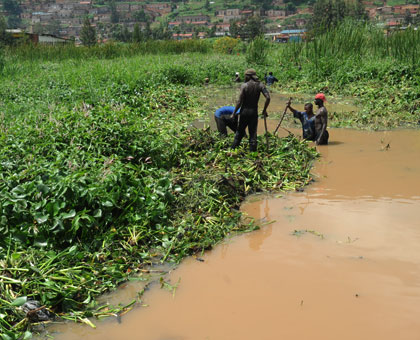Despite commendable efforts, African countries still have a lot to do in mitigating climate echange, environmental experts have said.


Despite commendable efforts, African countries still have a lot to do in mitigating climate echange, environmental experts have said.
Speaking to The New Times, yesterday, experts attending the Strengthening the Institutions for Transboundary Water Management in Africa (Sitwa) conference in Kigali said governments need to pool resources from all avenues to deal with effects of climate change.
"Some of these issues of climate change are cross-cutting and the best way to deal with them is countries working together but on a national level. African governments should enter into a private-public partnership with manufacturing companies to deal with these issues,” said Christophe Brachet, the deputy director-general of International Office for Water.
The United Nations Environmental Programme (Unep) indicates that by 2020, between 75 million and 250 million people in Africa are projected to be exposed to increased water stress due to climate change, while agricultural production, including access to food, in many African countries is projected to be severely compromised.
This would further adversely affect food security and exacerbate malnutrition.
Brachet said: "There is urgent need to increase financing of mitigation mechanisms to deal with these issues, otherwise the world is in for a very big problem.”
The cost of adaptation, according to Unep, could amount to at least 5 to 10 percent of Gross Domestic Product (GDP) of every African country.
However, according to Klas Sandstrom, a climate change consultant, funding of mitigation mechanisms should mainly come from the Western countries since they emit a lot of carbon-dioxide.
"Part of the funding should definitely come from African governments but also some mechanisms should be considered like fast-tracking modernisation of irrigation and doubling food production because the world is likely to face food crisis due to climate change,” he said.
Increased temperature
Figures indicate that by 2050, average temperatures in Africa are predicted to increase by 1.5 to 3°C, and will increase with time.
Warming is likely to be larger than the global annual mean warming throughout the continent and in all seasons, with drier subtropical regions warming more than the moister tropics.
Unep predicts that over the course of years, there will also be major changes in rainfall in terms of annual and seasonal trends, and extreme events of flood and drought.
While by 2020, in some countries, yields from rain-fed agriculture could be reduced by up to 50 per cent and crop net revenues could fall by as much as 90 per cent by 2100, with small-scale farmers being the most affected.
The project manager of Sitwa, Innocent Kabega, said African environmental sectors have to ensure they strengthen their capacity in dealing with climate change related issues.
"For that to happen there is need to put much emphasis on green investments. Global and continental investment wings such as the World Bank and African Development Bank are already investing in climate change mitigation, but African governments also need to come up with a public-private partnership plan in managing the climate change impact,” Kabega said.


